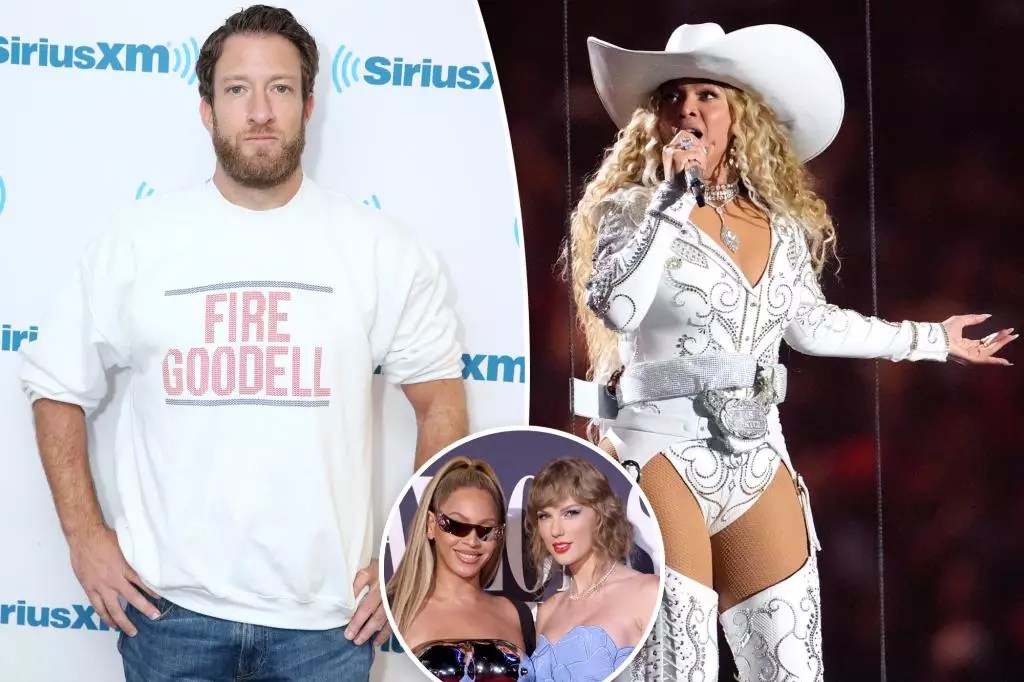In the vibrant and often contentious realm of pop culture, no rivalry seems to spark as much fervor as that between Taylor Swift and Beyoncé. This notable tension escalates further when influential figures like Barstool Sports founder Dave Portnoy weigh in with their takes on these megastars. Recently, Portnoy’s derogatory comments about Beyoncé’s halftime performance at the Baltimore Ravens vs. Houston Texans Christmas Day game highlight a pronounced bias towards his favored chanteuse, Taylor Swift. Statements made on social media can not only reflect personal preference; they also shape public narrative within the music industry.
Portnoy’s critique stems from more than a momentary lapse in judgment regarding Beyoncé’s artistry. He boldly suggested that the iconic artist has “been lost since Destiny’s Child.” While opinions about artists vary and should be welcome, such sweeping statements often overlook the ongoing evolution of an artist’s craft. Beyoncé has continued to deliver groundbreaking work, appealing to diverse audiences with her ability to transcend genres. Such serious claims can ultimately detract from meaningful discourse surrounding artists’ contributions to music and culture.
Beyoncé’s recent performance was grandiose, marked by her entrance on horseback and a dazzling attire that included a crystal-embellished ensemble. She showcased tracks from her latest country album, “Cowboy Carter,” which cleverly blends genres and showcases her vocal prowess. This mix included hits like “16 Carriages” and a soulful rendition of The Beatles’ “Blackbird.” Such artistic choices reflect her continuous exploration of different musical landscapes, indicative of her range as an artist.
Intriguingly, Portnoy’s dismissal of this multifaceted performance sparks a larger conversation about the expectations placed upon musicians. Audiences sometimes box artists into specific niches, yearning for them to perform within defined parameters. Yet, true artistry should allow growth, change, and experimentation, qualities that artists like Beyoncé and Swift possess. Judging an artist through the lens of their past work alone can lead to a misunderstanding of their current and future trajectories.
Portnoy’s criticism of Beyoncé is not an isolated incident. His previous remarks favoring Rihanna over Beyoncé during Super Bowl performances reveal a consistent preference for one pop star over another. His bold proclamations and public opinions can certainly shift the landscape of how fans perceive these artists’ merits. However, does this indicate an inherent bias towards Taylor Swift, aligning with his vocal admiration for her work? In an industry steeped in comparisons, the media often draws lines between these two superstars, placing them in a perceived competition for the crown of pop royalty.
Despite the divisive nature of this rivalry, Swift herself has shown a willingness to support other female artists, including Beyoncé. Sources report that she celebrates Beyoncé’s success, insisting upon a communal spirit among women in the music industry. In stark contrast to Portnoy’s harsh criticisms, Swift’s approach aligns with the modern ethos of empowering fellow artists, signifying a significant shift in the landscape of music that seeks to uplift rather than undermine.
Understanding the cultural significance behind these artist rivalries offers a deeper comprehension of the music industry’s evolving narrative. Historical moments, like Kanye West’s interruption of Swift at the 2009 MTV Video Music Awards, elevate the tension between these artists, amplifying their visibility and the commercial stakes involved. Such incidents infuse the industry with drama and intrigue but often overshadow the music that brought fans to these artists in the first place.
As public opinion becomes increasingly influenced by social media commentary, it is essential to evaluate these rivalries critically. Engaging in dialogue about music and artistry can be as potent a force as the performances themselves. Navigating the complex web of fan loyalty, industry politics, and personal opinion leads to an enriching narrative about the arts as a collective experience.
While figures like Dave Portnoy fuel the rivalry through personal preferences, the ever-evolving dialogue surrounding Taylor Swift and Beyoncé should underscore the importance of recognizing artistic growth, the significance of female empowerment, and the need for respectful discourse in a climate of passionate fandom. After all, the richness of the music world lies in its diversity of talent and expression.







Leave a Reply